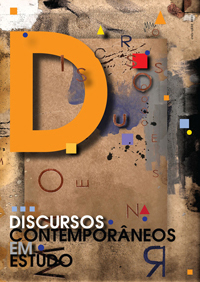A Análise de Discurso Crítica em apoio à gestão organizacional
DOI:
https://doi.org/10.26512/discursos.v1i1.0/8277Keywords:
Critical Discourse Analysis. Discourse Analysis. Information Management. Organizational Memory. Knowledge Management.Abstract
This paper aims to investigate the applicability of critical discourse analysis in the organizational management. For that, a review in the indexed documents of Proquest database was made, achieving nine articles and two doctoral thesis, from which analysis the following uses of discourse in management were obtained: change management, sense making, organizational management, knowledge management, context building, research methodology for strategic management and human resources management. Established the importance that discourse has at change management, and considering that the objective of information management is learning, this article proposes a process for discoursive information management.
Downloads
References
BAZERMAN, C. Gêneros textuais, tipificação e interação. São Paulo: Cortez, 2005.
BRUSAMOLIN, V. Narrativas de histórias: um estudo preliminar na gestão de projetos de tecnologia da informação. Ciência da Informação. v. 37, n. 1, 2008.
CAMILLE, H. J.; WILLIAN, C. M. Organizational storytelling: it makes sense. Business Horizons , v. 47, n. 4 , p. 23-32, jul./ago. 2004.
CHOO, C. W. Information management for the intelligent organization: roles and implications for the information professions. In: Digital Libraries Conference, mar. 27-28, 1995, Singapore. Disponível em: <http://choo.fis.utoronto.ca/fis/respub/dlc95.html >. Acesso em: 4 fev 2009.
CHOU, S. W. Knowledge creation: absorptive capacity, organizational mechanisms, and knowledge storage/retriveal capabilities. Journal of Information Science, v. 31 n. 6, 2005, p. 453-465.
DENNING, S. The leaders guide to storytelling: mastering the art and disciplines of business narrative. Jossey-bass, San Francisco, CA, 2005.
ECHEVERRÃA, R. Ontologia del lenguage. Dólmen Ediciones, Santiago, Chile, 1997.
ECHEVERRÃA, R. Reflexão, diálogo e ética nas organizações. Palestra proferida em 21 de maio de 2004, promovida pelo Instituto Ethos de Empresas e Responsabilidade Social no auditório da Serasa, em São Paulo. Disponível em: <http://www1.ethos.org.br/EthosWeb/arquivo/0-A-2d0reflexao13WEB.pdf>. Acesso em: 29 jun. 2009.
FAIRCLOUGH, N. Analysing discourse: textual analysis for social research. New York, Routledge, 2003.
FAIRCLOUGH, N. Discurso e mudança social. Tradução de Izabel Magalhães. Brasília: Ed. Universidade de Brasília, 2001.
FRANCIS, H. A critical discourse perspective on managers´experience of HRM. In: Qualitative Research in Organizations and Management: an international journal. v. 1, n. 2, 2006.
GARGIULO, T. L. The strategic use of stories in organizational communication and learning. New York, M. E. Shape, 2005.
HACKLEY , C. Silent running: tacit, discursive and psychological aspecs of management in a top UK advertising agency. British Journal of Management. v. 11, n. 3, 2000.
HARRISON, C.; YOUNG, L. Leadership discourse in action: a textual study of organizational change in a government of Canada department. Journal of Business and Technical Communication. v. 19, n. 1, 2005.
KOFMAN, F. Metamanagement: la nueva con-ciencia de los negocios. Buenos Aires, ed. Granica, 2005.
LE COADIC, Yves-François. A ciência da informação. 2. ed. Brasília. Briquet de Lemos/Livros, 2004.
McGEE, J.; PRUSAK, L. Gerenciamento estratégico da informação. Rio de Janeiro, Ernst&Young. Campus, 1994.
MOORMAN, C.; MINER, A. S. Organizational improvisation and organizational memory. Academy of Management Review, v. 23, n. 4, 1998, p. 698-723.
MOORMAN, C.; MINER, A. S. The impact of organizational memory on new product performance and creativity. Journal of Marketing Research, v. 34, 1997, p. 91-107.
PARK, E. P.; BUNN, M. D. Organizational memory: a new perspective on the organizational buying process. The Journal of Business & Industrial Marketing, 2003.
PHILIPS, N.; LAWRENCE, T.; HARDY, C. Discourse and institutions. Academy of Management Review, v. 29, n. 4, 2004.
PHILLIPS, N. The management of corporate legitimacy: an interpretive structuralist approach. Tese de doutoramento, Universidade de Alberta, Edmonton, 1995.
PHILLIPS, N.; SEWELL, G.; JAYNES, S. Applying critical discourse analysis in strategic management research. Organizational Research Methods. v. 11, n. 4, outubro 2008.
SILLINCE, J. A. A. Organizational context and the discursive construction of organizing. Management Communication Quarterly. v. 20, n. 4, may 2007.
SIMMONS, Annete. The story factor. Cambridge, MA, Basic Books, 2001.
SLATER, S. F.; NARVER, J. C. Market orientation and the learning organization. Journal of Marketing, v. 59, n. 3, 1995, p. 63-74.
STEIN, Eric W. Organizational memory: review of concepts and recommendations for management. International Journal of Information Management, v. 15, nº 2, pp. 17-32, 1995.
THOMAS. The Recontextualization of management: a discoursive-based approach to analysing the development of management thinking. Journal of Management Studies. v. 40, n.4, 2003
TRELEAVEN, L.; SYKES, C. Loss of organizational knowledge: from supporting clients to serving head office. Journal of Organizational Change. v. 18, n. 4, 2005.
VAARA, E.; KLEYMANN, B.; SERISTÖ, H. Strategies as discoursive constructions: the case of Airline Alliances. Journal of Management Studies. v. 41, n.1, 2004.
Downloads
How to Cite
Issue
Section
License
Autores que publicam nesta revista concordam com os seguintes termos:
a) Os(as) autores(as) mantêm os direitos autorais e concedem à revista o direito de primeira publicação, sendo o trabalho simultaneamente licenciado sob a Creative Commons Attribution License o que permite o compartilhamento do trabalho com reconhecimento da autoria do trabalho e publicação inicial nesta revista.
b) Os(as) autores(as) têm autorização para assumir contratos adicionais separadamente, para distribuição não-exclusiva da versão do trabalho publicada nesta revista (ex.: publicar em repositório institucional ou como capítulo de livro), com reconhecimento de autoria e publicação inicial nesta revista.
c) Autores têm permissão e são estimulados a publicar e distribuir seu trabalho on-line (ex.: em repositórios institucionais ou na sua página pessoal) após o processo editorial, já que isso pode gerar alterações produtivas, bem como aumentar o impacto e a citação do trabalho publicado (Veja O Efeito do Acesso Livre).
d) Os(as) autores(as) dos trabalhos aprovados autorizam a revista a, após a publicação, ceder seu conteúdo para reprodução em indexadores de conteúdo, bibliotecas virtuais e similares.
e) Os(as) autores(as) assumem que os textos submetidos à publicação são de sua criação original, responsabilizando-se inteiramente por seu conteúdo em caso de eventual impugnação por parte de terceiros.




